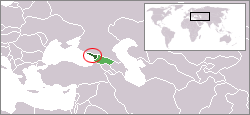
The United Nations Observer Mission in Georgia (UNOMIG) was established by United Nations Security Council Resolution 858 in August 1993 to verify compliance with a 27 July 1993 ceasefire agreement between the Republic of Georgia and forces in Abkhazia with special attention given to the situation in the city of Sukhumi, Georgia. It was also to investigate reports of ceasefire violations, attempt to resolve such incidents with the parties involved, and to report to the Secretary-General of the United Nations on the implementation of its mandate. 88 military advisors were authorized to be deployed to the region. It ended on 15 June 2009, when Russia vetoed an extension of the mission. The last observers left the region on 15 July 2009.

United Nations Security Council resolution 1065, adopted unanimously on 12 July 1996, after reaffirming all resolutions on Georgia, particularly 1036 (1996), the Council discussed efforts for a political settlement between Georgia and Abkhazia and extended the mandate of the United Nations Observer Mission in Georgia (UNOMIG) until 31 January 1997.

United Nations Security Council resolution 1096, adopted unanimously on 30 January 1997, after reaffirming all resolutions on Georgia, particularly Resolution 1065 (1996), the Council addressed the current situation extended the mandate of the United Nations Observer Mission in Georgia (UNOMIG) until 31 July 1997.

United Nations Security Council resolution 1124, adopted unanimously on 31 July 1997, after reaffirming all resolutions on Georgia, particularly Resolution 1096 (1997), the Council extended the mandate of the United Nations Observer Mission in Georgia (UNOMIG) until 31 January 1998.

United Nations Security Council resolution 1150, adopted unanimously on 30 January 1998, after reaffirming all resolutions on Georgia, particularly Resolution 1124 (1997), the Council extended the mandate of the United Nations Observer Mission in Georgia (UNOMIG) until 31 July 1998.

United Nations Security Council resolution 1187, adopted unanimously on 30 July 1998, after reaffirming all resolutions on Georgia, particularly Resolution 1150 (1998), the Council extended the mandate of the United Nations Observer Mission in Georgia (UNOMIG) until 31 January 1999, and discussed recent hostilities in the country.

United Nations Security Council resolution 1225, adopted unanimously on 28 January 1999, after reaffirming all resolutions on Georgia, particularly Resolution 1187 (1998), the Council extended the mandate of the United Nations Observer Mission in Georgia (UNOMIG) until 31 July 1999, and expressed an intention to review its mandate.

United Nations Security Council resolution 1255, adopted unanimously on 30 July 1999, after reaffirming all resolutions on Georgia, particularly Resolution 1225 (1999), the council extended the mandate of the United Nations Observer Mission in Georgia (UNOMIG) until 31 January 2000.

United Nations Security Council resolution 1287, adopted unanimously on 31 January 2000, after reaffirming all resolutions on Georgia, particularly Resolution 1255 (1999), the Council extended the mandate of the United Nations Observer Mission in Georgia (UNOMIG) until 31 July 2000.

United Nations Security Council resolution 1311, adopted unanimously on 28 July 2000, after reaffirming all resolutions on Georgia, particularly resolutions 1287 (1999) and 1308 (2000), the Council extended the mandate of the United Nations Observer Mission in Georgia (UNOMIG) until 31 January 2001.

United Nations Security Council resolution 1339, adopted unanimously on 31 January 2001, after reaffirming all resolutions on Abkhazia and Georgia, particularly Resolution 1311 (2000), the Council extended the mandate of the United Nations Observer Mission in Georgia (UNOMIG) until 31 July 2001.

United Nations Security Council resolution 1364, adopted unanimously on 31 July 2001, after reaffirming all resolutions on Abkhazia and Georgia, particularly Resolution 1339 (2001), the Council extended the mandate of the United Nations Observer Mission in Georgia (UNOMIG) until 31 January 2002.

United Nations Security Council resolution 1427, adopted unanimously on 29 July 2002, after reaffirming all resolutions on Abkhazia and Georgia, particularly Resolution 1393 (2002), the Council extended the mandate of the United Nations Observer Mission in Georgia (UNOMIG) until 31 January 2003.
United Nations Security Council resolution 1462, adopted unanimously on 30 January 2003, after reaffirming all resolutions on Abkhazia and Georgia, particularly Resolution 1427 (2002), the Council extended the mandate of the United Nations Observer Mission in Georgia (UNOMIG) until 31 July 2003.

United Nations Security Council resolution 1494, adopted unanimously on 30 July 2003, after reaffirming all resolutions on Abkhazia and Georgia, particularly Resolution 1462 (2003), the Council extended the mandate of the United Nations Observer Mission in Georgia (UNOMIG) until 31 January 2004 and endorsed the establishment of a police component.

United Nations Security Council resolution 1524, adopted unanimously on 30 January 2004, after reaffirming all resolutions on Abkhazia and Georgia, particularly Resolution 1494 (2003), the Council extended the mandate of the United Nations Observer Mission in Georgia (UNOMIG) until 31 July 2004.
United Nations Security Council resolution 1554, adopted unanimously on 29 July 2004, after reaffirming all resolutions on Abkhazia and Georgia, particularly Resolution 1524 (2004), the Council extended the mandate of the United Nations Observer Mission in Georgia (UNOMIG) until 31 January 2005.

United Nations Security Council resolution 1582, adopted unanimously on 28 January 2005, after reaffirming all resolutions on Abkhazia and Georgia, particularly Resolution 1554 (2004), the Council extended the mandate of the United Nations Observer Mission in Georgia (UNOMIG) until 31 July 2005.

United Nations Security Council resolution 1615, adopted unanimously on 29 July 2005, after reaffirming all resolutions on Abkhazia and Georgia, particularly Resolution 1582 (2005), the Council extended the mandate of the United Nations Observer Mission in Georgia (UNOMIG) until 31 January 2006.

United Nations Security Council Resolution 1716, adopted unanimously on October 13, 2006, after reaffirming all resolutions on Abkhazia and Georgia, particularly Resolution 1666 (2006), the Council extended the mandate of the United Nations Observer Mission in Georgia (UNOMIG) until April 15, 2007.














